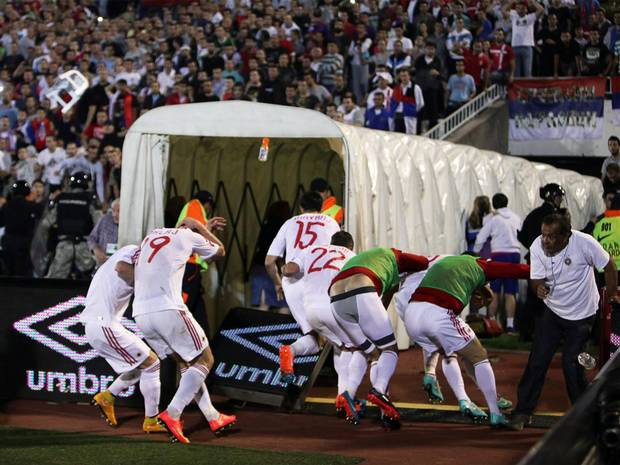John Bethell | Contributing Writer
Sport is usually something which brings humans together – it provides us with an enjoyable distraction from the mundanity of daily life and provides ample conversation fodder for any social situation. In 1914, it was a football match organised between England and Germany that brought about a temporary, albeit not ubiquitous, ceasefire and a welcome respite for both sides. On Tuesday night, however, it was a football match that reignited the Albanian-Serbian conflict and sparked fears that the incipient, relative peace that has been seen in the region might be even more short-lived than previously thought.
The political significance of the matchup could not be doubted. Serbia and Albania have had a long history of embittered mutual hatred and significant ethnic and religious tension. This tension centres around Kosovo, a disputed area (populated largely by Albanians) which was incorporated into Serbia as a result of the Ottomans’ defeat in the First Balkan War (1912-1913). While the ethnic and religious division between Kosovans and Serbs existed from this point, it was not until 1989 that Kosovo’s autonomy was specifically targeted – with its province status rescinded it was brought under the direct control of Belgrade. It came as communism was collapsing in Europe and this saw increased nationalism in Yugoslavia, (made up of Slovenia, Croatia, Bosnia-Herzegovina, Serbia, Montenegro and Macedonia.) All this culminated in a 1999 war between the Albanians and the Serbs, after which NATO wrenched Kosovo from Serbian hands.
Hooligans in one corner of the aptly named Partizan stadium burned a NATO flag, while chants of “Kill the Albanians,” from Serbian fans were heard virtually throughout the match. Bottles, batteries, flares and other objects were hurled at the Albanian players.
Since 2008, Kosovo has been a recognised state (by 108 UN members), independent from Serbia as the Republic of Kosovo – while Serbia still claim it as their own Autonomous Province of Kosovo and Metohija. This has been the outcome of more than eight years of conflict in the 1990s; collectively termed the Yugoslav Wars, the conflict is often termed “the most bloody since World War Two,” and has become infamous for the brutal crimes against humanity that it witnessed, including ethnic cleansing, rape and genocide. Combatants from both sides have since been held accountable for such crimes, but arguably the most brutal action was the July 1995 genocide which occurred at Srebrenica in the Bosnian War, which resulted in the murder of more than 8000 Bosniaks, mostly men and boys. Indeed, the then UN Secretary General Kofi Annan described the massacre as “the worst crime on European soil since the Second World War.”
In the warm up to the match, a UEFA Euro 2016 qualifier in Belgrade, Serbian officials warned that no away fans would be permitted to enter the stadium, and any Albanians attempting to do so would be arrested. As such the Albanian players, (of whom eight are Kosovars, who cannot form their own team because Serbia and its allies have blocked Kosovo’s entry into international football organisations) landed in Belgrade surrounded by Serbian police, while Albanian journalists were stopped and searched at the airport because they were wearing clothing decorated with Albanian insignia. By no means a normal start to an international football match.
One thing is for certain, though: UEFA’s pre-match evaluation that Albania and Serbia have “normal diplomatic relations” will have to be rethought.
Even before English referee Martin Atkinson blew the whistle for kick off, aggressive chants were emanating from both sides. The 41 minutes of the match that were played reflected the sheer hostility. Hooligans in one corner of the aptly named Partizan stadium burned a NATO flag, while chants of “Kill the Albanians,” from Serbian fans were heard virtually throughout the match. Bottles, batteries, flares and other objects were hurled at the Albanian players. But towards the end of the first half, a low flying drone was flown above the pitch, bearing a flag depicting “Greater Albania,” an area incorporating all parts of the Balkans where all ethnic Albanians live. This prompted a scuffle between Stefan Mitrovic of Serbia, who downed the drone, and the Albanian midfielder Bekim Balaj. This initiated a pitch invasion, as Serbian fans rushed onto the pitch to attack the Albanian players, prompting them to quickly flee to the dressing rooms (but not before another barrage of objects were hurled at them in the tunnel.) Though some Serbian players protected their Albanian opponents as they fled the pitch, the sheer number of pitch invaders (including one Ivan Bogdanov, an infamous ultranationalist Serb football hoologan) rendered the pitch highly dangerous.
Consequently the Albanian players stated that they felt unable to continue, and the match was abandoned. Bizarrely, Serbian media sources claimed yesterday that the pilot of the drone was the brother of Albania’s Prime Minister Edi Rama, Orfi Rama, when the culprit was later found to be an Albanian fans’ Facebook group, “The Smugglers.” But exactly who piloted the drone is now a moot point, because the events of Tuesday have demonstrated to the world that Balkan tensions are still very much alive. And though UEFA decided to fine both sides, at the end of the debacle seven Albanian players had been injured and, as their captain Lorik Cana explained, it was “a miracle” that no serious injuries were inflicted. In light of Serbia’s poor record on crowd control and racism in football, the charges levied on it by UEFA of “setting off fireworks, crowd disturbance, pitch invasion and “Insufficient organisation,” could mean that its future games may be played behind closed doors. One thing is for certain, though: UEFA’s pre-match evaluation that Albania and Serbia have “normal diplomatic relations” will have to be rethought.







